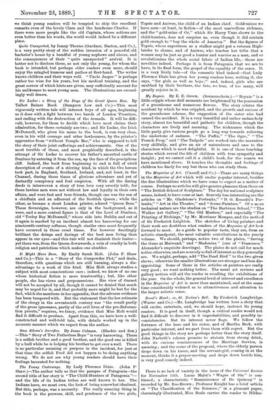Sir Ludar : a Story of the Days of the
Great Queen Bess. By Talbot Baines Reed. (Sampson Low and Co.)—This most vigorously written tale will interest boys of all ages, beginning as it does with a fight between two bands of London 'Prentices, and ending with the destruction of the Armada. It will be diffi- cult, however, for them to decide which hero most claims their admiration, for there certainly are two ; and Sir Ludar, the Irish McDonnell, who gives his name to the book, is run very close, even in his wild courage and utter lawlessness, by the printer's apprentice from "without Temple Bar," who is supposed to tell the story of their joint sufferings and achievements. One of the most terrible of these, and most graphically described, is the attempt of Sir Ludar to recover his father's ancestral castle of Dunluce by entering it from the sea, up the face of the precipitous cliff. Indeed, the book from beginning to end is full of vivid description of events of a stirring kind, in which the two heroes took part, in England, Scotland, Ireland, and, not least, in the Channel, during those times of glorious adventure and yet of dastardly conspiracy and foul suspicion. Witb all the daring deeds is interwoven a story of true love very sweetly told; for these lawless men were not without law and loyalty in their own affairs, and were fast and true friends, though one was the son of a chieftain and an adherent of the Scottish Queen ; while the other, as became a stout London printer, adored "Queen Bess." These Sovereigns, however, are only in the background, as it were, and a more central figure is that of the Lord of Dunluce, old " Torley Boy McDonnell," whose ride into Dublin and out of it again is marked by an incident almost too harrowing for our nineteenth-century softness, though similar ones must frequently have occurred in those cruel times. For however dazzlingly brilliant the doings and darings of the best men living then appear in our eyes—and this tale will not diminish their lustre— yet there was, from the Queen downwards, a vein of cruelty in both religion and patriotism which makes one shudder.






































 Previous page
Previous page